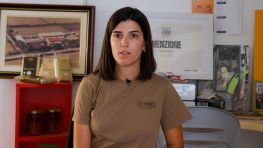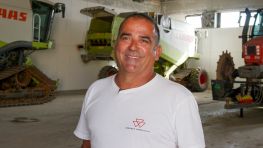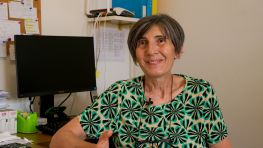 Rosalia Vacca and the Dream of…
Rosalia Vacca and the Dream of… Marco Fassone
Cascina Fassone and community support.
Marco Fassone, born in 1991, lost his father when he was still attending the Agricultural Institute of Vercelli, and despite himself he found himself having to decide whether or not to continue running the family farm. Starting from 2013 Marco begins, thanks to the help of some members of the Rovasenda agricultural community, and in particular of Fulvio Stocchi, to convert his company to the production of organic rice.
The process is completed in 2016 when, thanks to the financial support of a P.S.R., he converts the entire company to the organic method. Marco is now one of the producers who adhere to the Piedmont organic rice district and has actively participated in the Riso Bio System research project.
The company uses the rotation method, alternating, in half of the land, the production of soybeans with that of rice. In the other half of the land alternates a grass of vetch and ryegrass or even wheat, maintained until the month of May, to the production of rice. Broadcast rice is sown directly on the grass after the month of May. The lawn, felled and sometimes shredded, is submerged. Submersion determines the death of the grass and allows the germination of the rice seeds. The organic substance of the grass is thus transformed into a natural blanket that prevents the emergence of weeds, protects the rice seeds and finally nourishes them. On the fields left to soybeans, on the other hand, the following year, two false sowings are carried out, followed by the actual sowing.
Marco tells of his determination in pursuing the objectives he had set himself and above all the will with which he decided that the conventional farming system was no longer for him: tired of "eating weeds" he wanted to be able to live and work in a more clean and natural. Furthermore, Fassone claims to have learned more in recent years as an organic farmer than in a life of training and conventional agriculture: by observing the natural cycles of weeds he has understood how they grow and therefore also how to fight them. A completely different job than that of those who rely completely on a technician who sells chemical products.
Video table of contents
- Presentation.
- In 2008 the death of his father. I inherited a conventional company until 2013, when I met Fulvio Stocchi who showed me the green mulching method.
- The importance of public support for the transition to organic.
- The group and the importance of collaboration between farmers, the first biodistrict of bioveri rice.
- Agricultural techniques: rotation, green mulching, false sowing.
- No year is the same as another.
- After the death of the father: the importance of community help.
- In conventional lands I increased the treatments more and more and I was also tired of eating weeding.
- Skeptics about my choice to switch to organic: but I have a hard head.
- The antagonists of organic: difficult to change the cultivation system.
- The coexistence of conventional and organic: the discharge of water.
- I have learned more in these years that I have made organic than in all the years that I have done conventional: understanding the reasons for things.In conventional, we trust the technician who is the one who sells us the product.
- From the arid landscape of the conventional paddy field to the completely green landscape: how nature and my life have changed.
- A controversial aspect of the mulching system: post fermentation water discharge.
- The cultivated varieties: Rosa Marchetti among the historical varieties; Selenium, Gladius and Cameo.
- I never started the harvest on Monday and the blessing of the means.
- Naturally grown rice is healthy, especially if you eat it whole.
- The inheritance for my son, the hopes for the future.
Interview information
Country: IT
Region: Piemonte
City: Rovasenda
Locality: Cascina Fassone
Marco Fassone
Date of birth: 12-19-1991
City: Gattinara
School: High school or Secondary
Profession: Farmer
Languages: Italiano
Document by: Luca Ghiardo
Video by: Luca Ghiardo
Created: 01-06-2021
Questo video fa parte del seguente archivio
Rice stories
Rice stories
Food is a fundamental resource for man and his health, both through the supply of nutrients and the ability to embody traits of human culture that play a leading role in our well-being.
Over time, each territory has built original ways in which to relate to the fruits of its land, enriching them with rituals, symbolic meanings and culinary customs. Much of these relationships have been lost following the years of the economic boom, with the exodus from the countryside to urban centers, with the advent of agriculture for mass production and ultimately with the globalization of markets and the consequent impoverishment of the heritage of biodiversity and ethnodiversity.
The purpose of this archive is to collect evidence relating to the main rice production area in Europe, that is the Po Valley, and to investigate, through the analysis of textual sources and testimonies collected in the field, both what survives of this heritage, and the ways in which which has evolved and reached us, paying particular attention to the explicit and implicit links that bind food and health.






